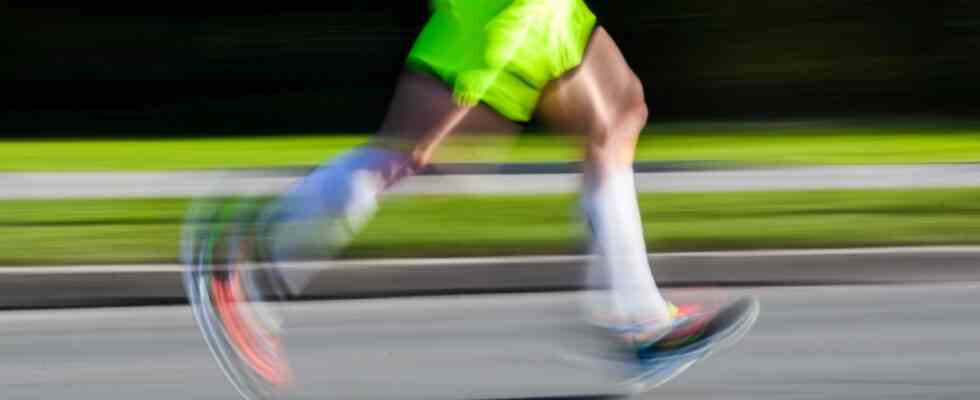The corona infection is over, your legs are tingling, you feel the urge to go outside, especially in spring. Movement is important and healthy, the body should be strengthened again after surviving an infection. But how should you start running again? Haven’t competitive athletes unexpectedly suffered from heart muscle inflammation? The SZ asked experts and found out: Listen to your own body and be careful and patient with yourself. Age and fitness level also play an important role.
All in all, after a Covid infection, you should start exercising slowly and listen to yourself. This is also recommended by Georg Wallner, sports scientist and athletics trainer at SpVgg Unterhaching. He also has a very practical tip ready: “If the Covid infection has really healed, return to your normal everyday life for a week, maybe go for a few walks, but no sport yet. If this first ‘normal’ week goes well, you can gradually start running, gradually increasing the load or training intensity. It takes time and, above all, patience.” Wallner, who also worked in a rehabilitation clinic for many years, warns that if you are a recreational athlete or someone who has not done much sport before and now wants to get back into it (again), you should not get overzealous at first. A heart-lung examination sets the direction for his top-flight footballers.
The resting heart rate as an indicator
There is a risk of heart muscle inflammation if you start to exert yourself too quickly with a high heart rate. In this, myocarditis, pathogens, mainly viruses, penetrate the cells of the heart muscle, which can lead to the destruction of heart muscle tissue. The body’s own immune system can often counteract this process and achieve healing, writes the German Heart Foundation. Myocarditis can occur if you delay an ordinary infection or don’t cure a cold properly, explains the internist and sports doctor Isabel Fechner from Ottobrunn. She emphasizes that the main point of attack for the SARS-CoV-2 virus is the airways and lungs. However, it can also attack the heart muscle directly and cause inflammation there, but does not have to do so. This is possible for everyone, regardless of age or fitness level. The symptoms are very unspecific, rather individual and varied: “Signs are weakness or tiredness, more typical are cardiac arrhythmias. So if you feel your heart racing or palpitating or you feel pressure on your chest, you have to stop exercising immediately and investigate the event,” says the doctor.
Everything is measured and checked: fitness trainer Georg Wallner keeps a close eye on the SpVgg Unterhaching athletes.
(Photo: private)
Your own heart rate offers good control. With regard to the resumption of sport, i.e. running training, Fechner relies on the resting heart rate: “If this is five to ten beats per minute higher than before the infection, you have to wait before doing sport”. If you can start again, the maximum heart rate is the benchmark. According to both experts, the load should not exceed 70 percent of your maximum heart rate – i.e. 220 minus your age. “For a 50-year-old, the maximum pulse rate allowed is 119 beats per minute,” explains Wallner.
He warns, “People tend to start out too intensely.” On the other hand, someone who has been ill for a long time or has not exercised at all or is overweight does not come up with this idea on their own because their heart rate reaches the 70 percent mark too quickly. “But even with (brisk) walking you prepare your cardiovascular system and your joints, tendons and ligaments for the later strain of running. So that’s totally fine!” Experience has shown that if you go walking or jogging twice a week, your basic endurance improves. From time to time an intensive, i.e. faster run not only gives new incentives, but also variety. If you have a racing heart or feel a tightness in your chest or a stinging sensation, you have to stop the movement immediately.
The position paper “Return to sport during the current coronavirus pandemic” by the Science Council of the German Society for Sports Medicine and Prevention (DGSP) recommends taking breaks from sports for two weeks to six months after surviving the infection, depending on the severity of the disease. Every athlete with a positive test result and/or typical symptoms should be examined by a sports doctor before starting sports, with a blood test and resting ECG (as of May 2020).
Sports medicine specialist Isabel Fechner differentiates between professional and recreational athletes.
(Photo: Sebastian Gabriel)
Fechner emphasizes that a distinction must be made between professional and recreational athletes. It makes sense today if those who have survived at least one more serious infection at home have themselves listened to and an ECG written. A cardiological examination is not absolutely necessary just because of a symptom-free positive corona finding. Especially since even the soccer players of the SpVgg Unterhaching feel the limited capacities. You have to go to different doctors because one heart or lung specialist cannot examine everyone. Conclusion: the physicians unanimously advise that you like to start running, but with caution and above all with joy.

